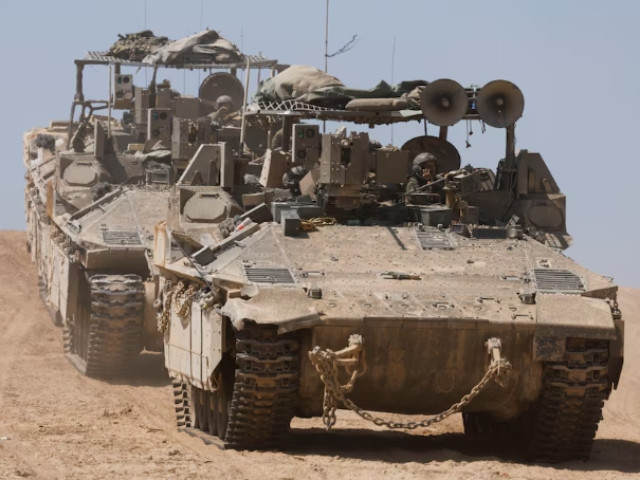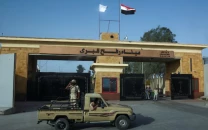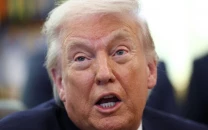Israeli military vows response to Iran attack as calls for restraint mount
Iran will respond to any action against its interests, says President Ebrahim Raisi

Israelis awaited word on how Prime Minister Benjamin Netanyahu would respond to Iran's first-ever direct attack as international pressure for restraint grew amid fears of an escalation of the conflict in the Middle East.
Netanyahu on Monday summoned his war cabinet for the second time in less than 24 hours to weigh a response to Iran's weekend missile and drone attack, a government source said.
IDF Chief of Staff Herzi Halevi said Israel would respond. He provided no details.
"This launch of so many missiles, cruise missiles, and drones into Israeli territory will be met with a response," he said at the Nevatim Airbase in southern Israel, which sustained some damage in Saturday night's attack.
The prospect of Israeli retaliation has alarmed many Iranians already enduring economic pain and tighter social and political controls since protests in 2022-23.
Iran will respond to any action against its interests, President Ebrahim Raisi told Qatari Emir Sheikh Tamim bin Hamad al-Thani on Tuesday, according to the Iranian Student News Agency.
Iran launched the attack in retaliation for the April 1 Israeli airstrike on its embassy compound in Damascus, and signalled that it does not seek further escalation.
While the attack caused no deaths and limited damage, it has increased fears of open warfare between the long-time foes and fuelled concerns that violence rooted in the Gaza war is spreading.
US President Joe Biden told Netanyahu at the weekend that the United States, which helped Israel blunt the Iranian attack, will not participate in an Israeli counter-strike.
Since the war in Gaza began in October, clashes have erupted between Israel and Iran-aligned groups in Lebanon, Syria, Yemen and Iraq. Israel said four of its soldiers were wounded hundreds of meters inside Lebanese territory overnight.
It appeared to be the first such known incident since the Gaza war erupted, although there have been several exchanges of fire between Israel and Lebanon's armed group Hezbollah.
"We're on the edge of the cliff and we have to move away from it," Josep Borrell, the European Union's foreign affairs chief, told Spanish radio station Onda Cero. "We have to step on the brakes and reverse gear."
French President Emmanuel Macron, German Chancellor Olaf Scholz and British Foreign Secretary David Cameron made similar appeals. Washington and United Nations Secretary-General Antonio Guterres also have called for restraint.
White House national security spokesman John Kirby declined on Monday to say if Biden urged Netanyahu in talks on Saturday night to exercise restraint in responding to Iran.
"We don't want to see a war with Iran. We don't want to see a regional conflict," Kirby told a briefing, adding that it was for Israel to decide "whether and how they'll respond."
US Treasury Secretary Janet Yellen said Iran's actions threaten stability in the Middle East and could cause economic spillovers. The US would use sanctions, and work with allies, to keep disrupting Iran's "malign and destabilizing activity", she added.
However, some analysts said the Biden administration was unlikely to undertake dramatic sanctions action on Iran's oil exports due to worries about boosting oil prices and angering top buyer China.
In a call between the Chinese and Iranian foreign ministers, China said it believed Iran could "handle the situation well and spare the region further turmoil" while safeguarding its sovereignty and dignity, according to Chinese state media.
Russia has refrained from publicly criticising its ally Iran but has also urged restraint.
"Further escalation is in no one's interests," Kremlin spokesman Dmitry Peskov said.
G7 mulls Iran sanctions
Iran's retaliatory attack, involving more than 300 missiles and drones, caused modest damage in Israel. Most were shot down by Israel's Iron Dome defence system and with help from the US, Britain, France and Jordan.
In Gaza itself, where more than 33,000 Palestinians have been killed in the Israeli offensive according to health ministry figures, Iran's action drew applause.
Israel began its campaign against Hamas after the Palestinian resistance group carried out a raid against the settlercolonial entity on October 7, as a response to decades of oppression and arbitrary killings of Palestinians.
British Prime Minister Rishi Sunak said the Group of Seven major democracies were working on a package of coordinated measures against Iran.
"I spoke to my fellow G7 leaders, we are united in our condemnation of this attack," Sunak said in parliament.
Italy, which holds the rotating G7 presidency, said it was open to new sanctions and suggested any new measures would target individuals. In an interview with Reuters, Italian Foreign Minister Antonio Tajani said all G7 members would have to back new sanctions.
Iran's attack has disrupted travel, with at least a dozen airlines cancelling or rerouting flights, and Europe's aviation regulator reaffirming advice that airlines use caution in Israeli and Iranian airspace.



















COMMENTS
Comments are moderated and generally will be posted if they are on-topic and not abusive.
For more information, please see our Comments FAQ